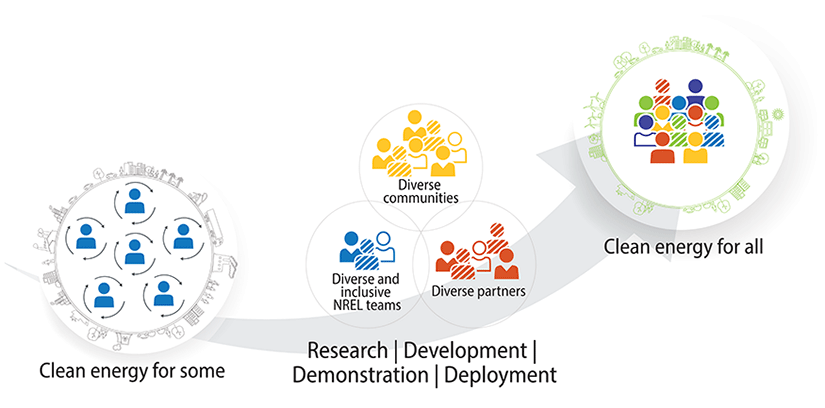Energy Justice
NREL develops and delivers inclusive energy solutions that enable all people to participate in the transition to sustainable energy, and prioritizes equitable distribution of energy benefits and burdens.

For decades, NREL has been a leader in applied clean energy research. We accelerate the clean energy transition broadly, prioritizing equitable distribution of social, economic, and health benefits and burdens across all segments of society.
Energy Equity Is Central to Our Work
NREL places energy equity at the center of our mission-driven work by:
- Integrating diversity and equity throughout the innovation process to develop technologies and tools that make community-driven energy transitions possible
- Working with historically marginalized communities and other partners to address energy challenges and identify, evaluate, and implement solutions
- Analyzing the benefits and burdens of various energy transition pathways and the extent to which they accrue broadly and equally
- Validating community-prioritized energy solutions in at-scale simulations to demonstrate impacts before implementation.
See our fact sheet to learn how NREL is Working Toward an Equitable Energy Future.
Engagement Yields Codeveloped, Equitable Solutions
Having worked with thousands of communities and organizations—in the United States and around the world—NREL knows equitable energy systems are defined and driven by the people who live and work within them. NREL begins with engagement, incorporates feedback throughout the process, and responds to communities' needs as conditions and priorities change over time.
Communities Local Energy Action Program (LEAP) Pilot
Energy Transitions Initiative Partnership Project Community Technical Assistance
Multilab Energy Planning Support for Puerto Rico
NREL Follows Up LA100 Study With Equity Strategies Initiative
NREL's Subarctic Laboratory Honors Villagers' Culture While Building Energy-Efficient Homes
NREL's Analysis Informs Equitable Clean Energy Transitions in Kingston, New York
Projects Bring Transportation Options to Small Towns
Q&A With Eric Lockhart: Centering Community Needs Within Clean Energy Solutions
Q&A With Jaquelin Cochran: LA Is Prioritizing Environmental Justice on Path to 100% Renewables
Round 3 of the Solar Energy Innovation Network
State, Local, and Tribal program (including Weatherization efforts)
Energy Justice Research Reflects Diversity
Inclusive participation in, access to, and ownership of energy are foundational to a clean energy future for the world. Innovation is born from diversity, and NREL's path to energy justice must include diverse teams, communities, and collaborations in all stages of research, development, demonstration, and deployment.
Basic Research Needs To Understand the Human Dimensions of Energy Systems
Bundling Strategies Offer Solutions to Microgrid Challenges
Inclusive Energy Innovation Prize
Inclusive Energy Innovation Prize Selects Climate Justice Changemakers
Landmark Demonstration Shows How Common Wind Turbine Can Provide Fundamental Grid Stability
Large-scale Experiments Demonstrate Advanced Controls for Autonomous Energy Systems
Mobility Equity Research Spans Diverse Needs of Underserved Communities
NREL Teams With U.S. Navy and Others on Kauai Clean Energy Microgrid Project
Solar Energy Innovation Network (SEIN) Helps Communities Develop Transformative Approaches to Adopting Solar Energy
Student Training in Applied Research Undergraduate Internship program
Energy Equity-Focused Resources
Accurate, detailed data and insights lead to more inclusive, better-informed decision-making. Many of NREL's tools are free, publicly accessible, and complemented by user guides.
Advanced Research on Integrated Energy Systems (ARIES)
Distributed Generation Market Demand (dGen™) model
Electric Vehicle Infrastructure for Equity (EVI-Equity) Model
Low-Income Energy Affordable Data (LEAD) Tool
Mobility Energy Productivity (MEP) Tool
NREL-U.S. Agency for International Development Global Toolkit
Publications
Benefits and Critical Knowledge Gaps in Determining the Role of Floating Photovoltaics in the Energy-Water-Food Nexus, Sustainability (2021)
Evaluating Energy Efficiency Potential in Low-Income Households: A Flexible and Granular Approach, Energy Policy (2019)
Exploring the Impacts of a National U.S. CO2 Tax and Revenue Recycling Options with a Coupled Electricity-Economy Model, Climate Change Economics (2018)
Gender Equity and Mainstreaming in Renewable Energy Policies—Empowering Women in the Energy Value Chain in the Economic Community of West African States, Current Sustainable/Renewable Energy Reports (2019)
Intersections of Disadvantaged Communities and Renewable Energy Potential: Data Set and Analysis to Inform Equitable Investment Prioritization in the United States, Renewable Energy Focus (2022)
Looking Beyond Bill Savings to Equity in Renewable Energy Microgrid Deployment, Renewable Energy Focus (2022)
Public Value Mapping To Assess and Guide Governmental Investments in Energy and Environmental Justice: Studying the United States Department of Energy, Renewable and Sustainable Energy Reviews (2023)
Risk Inequality and the Food-Energy-Water Nexus: A Study of 43 City Adaptation Plans, Frontiers in Sociology (2019)
2021 Joint Institute for Strategic Energy Analysis Annual Meeting Keynote: Energy Equity, Presentation (2021)
Accelerating Clean Energy @Scale: Place-Based Solutions, Presentation (2021)
Accelerating Clean Energy at Scale in Your Community, Fact Sheet (2022)
Building a Just Transition to a Sustainable Energy Future, Presentation (2021)
Building a More Diverse, Equitable, and Inclusive Energy Efficiency Workforce, NREL Technical Report (2022)
Energy Justice: Key Concepts and Metrics Relevant to EERE Transportation Projects, NREL Technical Report (2021)
Equitable Demonstration and Deployment Roundtable Report, NREL Technical Report (2022)
Expanding the Baseline: Community Perspectives on Equity in Land-Based Wind Energy Development and Operations, NREL Technical Report (2024)
Increasing Diversity in Energy Efficiency Professions: JUMP into STEM, 2020 ACEEE Summer Study on Energy Efficiency in Buildings (2021)
Intersections of Disadvantaged Communities and Renewable Energy Potential: Analyses to Inform Equitable Investment Prioritization, Presentation (2021)
Mobility Data and Models Informing Smart Cities, NREL Technical Report (2019)
NREL Support to Louisville Metro Government, Presentation (2021)
PR100: Puerto Rico Grid Resilience and Transition to 100% Renewable Energy, Presentation (2022)
Pathways to a Sustainable Aviation Ecosystem: Sustainable Aviation for Developing Economies, Fact Sheet (2023)
Practical Approaches To Embed Energy and Environmental Justice Into DOE Technology Portfolios: August 2021–August 2024, NREL Subcontract Report (2023)
Setting the Baseline: The Current Understanding of Equity in Land-Based Wind Energy Development and Operation, NREL Technical Report (2023)
Solar Futures Study, U.S. Department of Energy Technical Report (2021)
The Solar Influencer Next Door: Predicting Low-Income Solar Referrals and Leads, Presentation (2021)
Working Toward an Equitable Energy Future, Fact Sheet (2022)
Contact
To learn more, contact Technical Lead Eric Lockhart or Partnerships Development Lead Scott Haase.
Share

